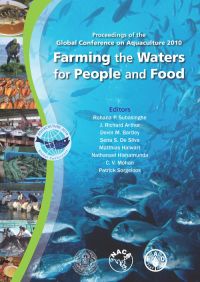Global Conference on Aquaculture 2010
2 February 2011 | 90939 views | Environment and Sustainability, Thailand
The conference was organised by FAO, the Thai Department of Fisheries and NACA and held in the Mövenpick Resort and Spa, Phuket, Thailand, 22-25 September. The conference was the third in a series of aquaculture development conferences, following on from the Conference on Aquaculture in the Third Millennium held in Bangkok 2000, and the FAO Technical Conference on Aquaculture, held in Kyoto 1976.
The programme included seven regional and global reviews on aquaculture development, nine plenary and invited guest lectures, and twenty expert panel discussions across six thematic sessions. This audio collection represents the entire conference proceedings.
Creative Commons Attribution.
